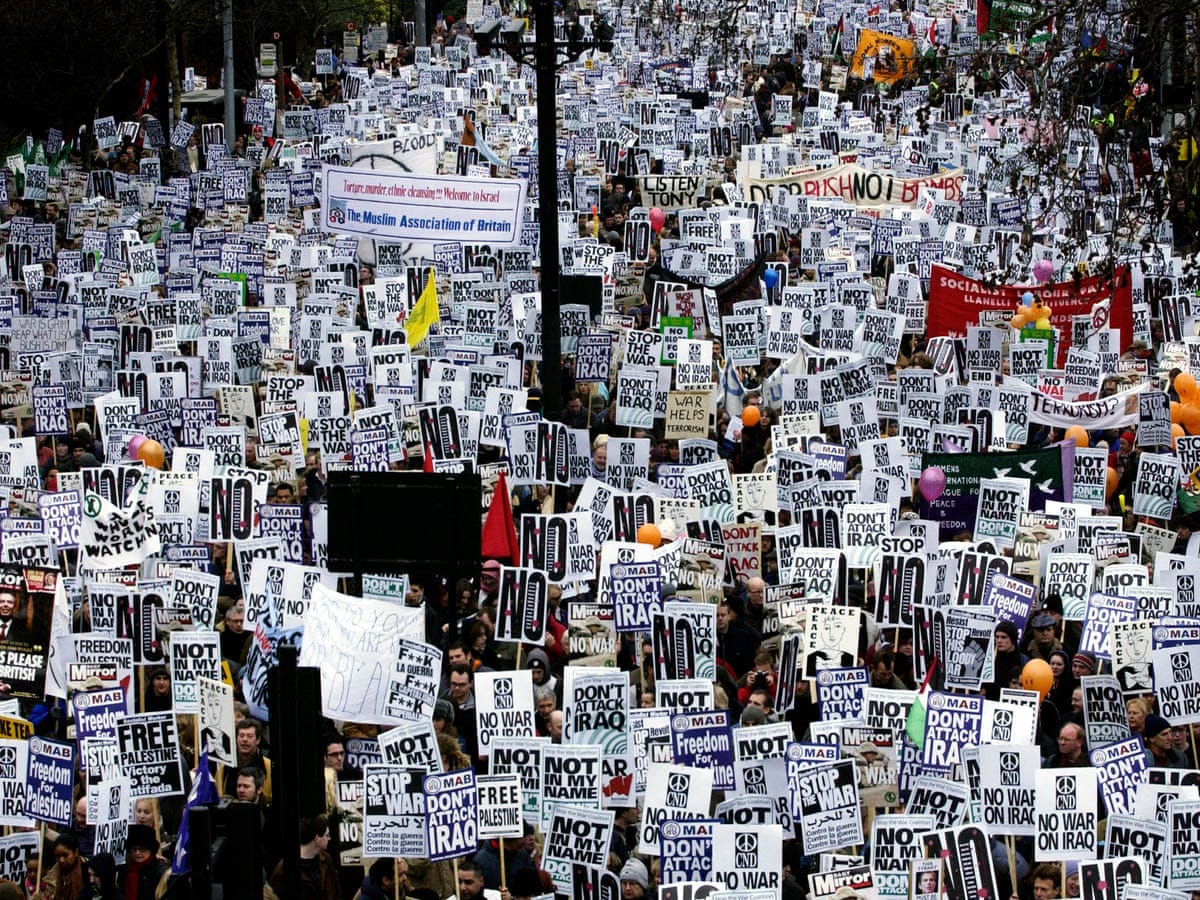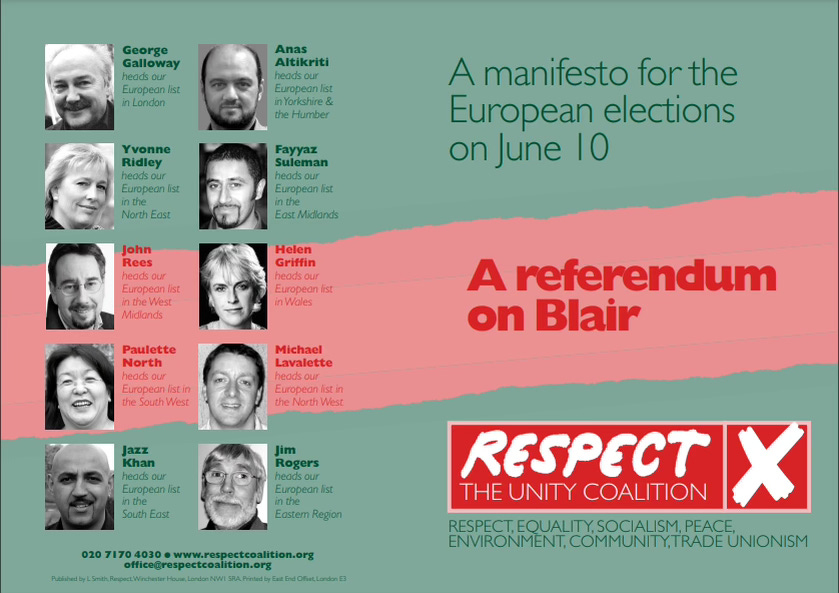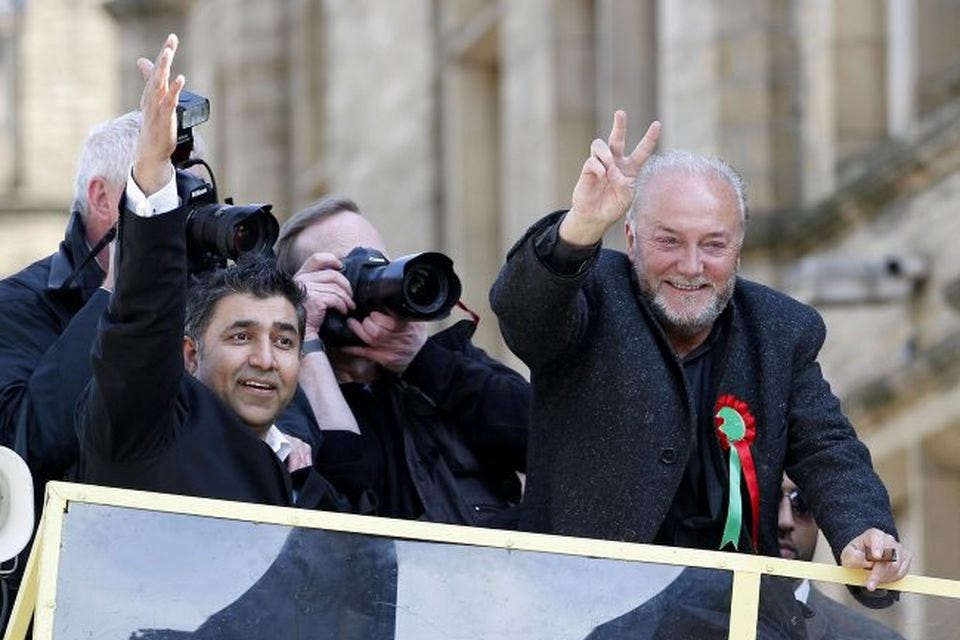Forming yet another Respect-type party will get us, well, No Respect
This is Part One of the “Learning our History” Dossier.
In mid-March 2024, it is pretty safe to make two political predictions.
Within 12 months, Keir Starmer will be heading a new Labour government.
Within 24 months—and perhaps even sooner—more and more socialists and progressives will have concluded: we need a new radical mass socialist party in the UK. Labour in power will be much the same as the Tories in power.
Moreover, by then, perhaps a growing number of political activists will realise that putting up X number of “independent “ socialist candidates in the following general election will be about as effective a political strategy as hoping some local lads who live down your road will triumph in a footie match against Arsenal FC. Or let’s hope they do.
But the more important question is: what type of party do we need to lead the fight for the radical transformation of our economy and politics?
Will it be a party like Left Unity which was formed in 2013 and then lost hundreds of members and essentially imploded two years later when the Labour Party took a tilt to the left under Corbyn?
Or will it be a party like Breakthrough which was created in 2021, but had a totally inexperienced leadership and managed to create only a single local branch in all of England over two years? In other words, nothing to trouble Starmer, Reeves and co.
Or will it be a party like the Workers Party Of Britain formed in 2019 to serve one main purpose: to be electoral vehicle for its leader … and a party, it should be noted, that is notably lacking in a democratic internal life. Who would want to join such an outfit?
As well, all three were (and are) particularly weak in mass campaigning or building any type of base. We simply must do better.
Since late 2023, a group of about ten of us have been researching and discussing a wide number of failed left groups and parties that have been established in the UK in the past 25 or so years. Our group is called the Learning our History (LOH) project, so named because the history, failings and occasional successes of such groups are about as well-known as… think of something completely forgettable.
One thing is very clear: we cannot move ahead unless we look very critically at past attempts at left party building. We in LOH don’t claim our appraisals are the last word. Our main objective is to open a debate.
Below we publish Part One of the LOH Dossier, an assessment of the Respect Party that existed (at least officially) from 2004 until 2016.
Respect at a glance:
Founded: 2004 (Respect - the Unity Coalition)
Wound up: 2016.
Founders/Key Players: George Monbiot, Salma Yaqoob, George Galloway, Lindsey German
Membership: 3-4 thousand at its peak
By Ian Glenister (guest post)
Main theme/Programme: Growing out of the Stop the War Coalition, where left wing groups found common ground with Muslim organisations, Respect is an acronym for Respect, Equality, Socialism, Peace, Environment, Community, Trade Unionism. The party therefore stood for peace, publicly owned services and a ‘decent future for all’. Policy platform included taxing the rich, nationalisation and greater involvement of Muslims in mainstream politics.
If the tale of Britain’s left-of-Labour party start-ups is a cautionary one, Respect, once described as ‘Britain’s most successful Radical left party’ is a case in point. Beginning as a political personification of the anti-Blair, anti-war, anti-business-as-usual feeling that was sweeping most elements of society in the early naughties, it soon fell victim to those familiar banes of fringe parties that are denied electoral success by the dead weight of our First Past the Post system (FPTP): poor organisation, egotism, hubris, leaderism, factionalism, and worst of all, forgetting why they were set up in the first place.
“Stop the War” Was a Launchpad
It is impossible to understand the rise of Respect without reference to the hugely popular Stop the War Coalition (StWC) from which it spawned. The latter was set up in 2001 by a rag-tag of establishment notables as well as radical political entities, united in their disgust at Britain’s involvement in wars, first in Afghanistan and then in Iraq.
Their political marches and rallies around the UK attracted millions and were the largest demonstrations in British history. Speakers at their rallies included Tony Benn, George Galloway, Tam Dalyell, Jeremy Corbyn and the playwright Harold Pinter, all speaking in front of a million strong crowds.
With the Socialist Worker Party (SWP) activist, Lindsey German, as convenor of the coalition, StWC had a very broad base. Among its ranks were retired generals, Labour Left grandees, old peaceniks, former ambassadors, and anti-globalisation protestors, as well as quasi political entities such as Greenpeace and of course the burgeoning SNP.
Stop the Iraq War marches drew hundreds of thousands in 2003. (Credit: The Guardian)
But among the most significant supporters, who’s large number were later to become key to the success of Respect, were members of the Muslim community who felt disenfranchised by the British political system and socially marginalised by the events of 9/11. Muslims have always regarded Islamic kinship above secular nationhood.
Since the oncoming wars waged by the West were all against (notionally at least) Muslim countries, UK Muslims became attracted to the StWC slogan “against the racist backlash”. They became involved in great numbers when the StWC worked alongside the highly- connected Muslim Association of Great Britain who helped organised its demonstrations.
Now, imagine the power felt by the speakers and attendees at the StWC events as millions watched and cheered. They must have felt a groundswell, a sea change, an uprising of popular support for ideas that could change society forever. Could this energy be harnessed for political ends, not just to stop wars, but to change Britain into a more equitable society?
One of the most passionate and articulate of the speakers was George Galloway, a former Labour MP of the old socialist left, expelled for his vociferous objection to the coming wars (and he hated Blair). The idea of electorally punishing the party that rejected him was an appealing possibility as he engaged the huge crowds with his powerful rhetoric.
But the founders of Respect were not this political firebrand but the environmentalist/journalist George Monbiot and leading Muslim StWC organiser Salma Yaqoob. This combination is interesting as it combined green activism and pacifism with links to the wider Muslim community. In hindsight this might look incongruous, but at the time as an attempt to unite progressive forces, it was necessary.
Respect co-founder Salma Yaqoob (who later resigned in a dispute initiated by Galloway).
Intended as a “Party for Muslims”
Indeed, the aim of the party was to widen the appeal of traditional left-wing parties to include peace activists and religious groups who were not served by the mainstream parties. Among the Asian communities at election time, it was touted as the “party for Muslims”.
Mindful of being tied to its single-issue origin, the party claimed to stand not only for peace, but for publicly owned services and a ‘decent future for all’. Respect was (or became) an acronym for Respect, Equality, Socialism, Peace, Environment, Community and Trade Unionism. Its policy platform included taxing the rich, nationalisation and greater involvement for Muslims in mainstream politics. Initially self-funded from its growing membership, some local trade union branches, disinclined to continue support for Blair’s New Labour, affiliated to Respect.
Respect also became popular with university students whose energy and geographical spread helped Respect in their canvassing, particularly during general elections.
Initial Electoral Success
2004 was potentially a busy year in politics with elections for the European Union Parliament, Local elections and preparation for a likely General Election in 2005. Recognising some policy overlap between left wing groups fighting against each other in the same elections, the Monbiot camp insisted Respect forge electoral pacts with the Green Party, but this was rejected leading to Monbiot’s resignation from the party.
Electorally, Respect had a slow start. Its first outing was in the 2004 elections for the European Parliament, which, incidentally, were held under proportional representation in the UK. Respect polled over 250,000 votes - not bad given the low turnout for EUP elections and the newness of the party - but failed to win any candidates even under the PR system. Respect’s highest vote take was in London (5%), but it only managed 1.7% nationally, much less than the Green Party and UKIP. The same year Respect attracted 4.5 % of the vote for the London Assembly.
Respect's first manifesto aimed to make the EU elections a referendum on Tony Blair and New Labour.
But success eventually came in 2004 in the St Dunstan’s and Stepney Green ward council by-election (Tower Hamlets) where it secured 31% and won a council seat. Other council by-elections proved a failure, but Respect secured seats through defection in other councils. Because of the Respect fielded candidates in 26 constituencies, thanks to the broad geographical base of the SWP who provided most of them.
In 2005, East London became the focus target for General Election success, and Galloway became Respect’s first MP by winning Poplar and Bow from Labour with a narrow majority after a highly personalised, vicious campaign against the Labour candidate. Respect also came a creditable second in E&W Ham and Birmingham Sparkbrook & Small Heath. Nationally, however, Respect secured an average of around 7% of the vote where they stood as candidates.
Success continued in 2006 when Respect became the official opposition to Labour in the London borough of Tower Hamlets, and in Birmingham where Salma Yaqoob became the first female Muslim councillor in Britain when Respect secured 55% of the vote in the Sparkbrook ward.
Cracks Showing in the Unity Coalition
However, as ever with the radical left, it wasn’t long before the cracks began to show. Galloway’s ambition for Respect and his differences with the SWP caused a split between Respect and the formation of a breakaway grouping, Left List, led by Lindsey German. The two groups were often pitted against themselves in local elections.
It is worth noting that SWP’s alliance with Respect was not universally welcomed within either party. The rank-and-file SWP members did not agree with the SWP leadership on the involvement with Respect and many left to join other left groupings. For Respect members, the SWP’s insistence on ‘socialist purity’ and centralised control alienated many. And, of course, how does anyone deal with the force of nature that is George Galloway?
After the split with the SWP, the focus for Respect was on just two demographic constituencies: Bengali East London and Pakistani/Kashmiri Birmingham.
However, 2010 was a General Election year, and as the New Labour project began to fail, Respect saw the likelihood of a hung parliament as an opportunity to be parliamentary power brokers if they could secure a few MPs. Doing so would require Respect candidates to move on from the anti-war message that helped their early support in an election that they anticipated would have a low turnout due to public antipathy for the status quo.
Unfortunately for Respect, voter turnout increased in 2010 and Respect’s fringe appeal was largely eroded by UKIP, as anti-immigration and anti-Europe sentiment began to take hold in many constituencies and the memory of New Labour’s wars faded. Perhaps fear of a Conservative victory also led some former Respect voters to return to the safer ground of Labour.
In the event, not one Respect MP was elected, and its national GE polling produced only 33,251 votes. In the local elections, Labour won back most of the seats previously lost to Respect, either electorally or through defections from Labour.
From then on Respect was on a rapid decline and continued to lose its local authority seats. Galloway’s attempt at return to importance in Glasgow as an MSP under its proportional voting system in 2011 failed, and he came in behind the Green Party candidate. Galloway’s star was clearly falling…
Life in the Old Dog?
…Or was it?
Just as it looked like Respect would disappear into the ether, there was a surprising re-emergence when Galloway spectacularly won the 2012 Bradford West by-election in a former safe Labour seat. With the swing to Respect from Labour a staggering 53% (among the largest ever in Parliamentary elections) it seemed there was life left in Respect.
George Galloway atop the Respect bus after winning the Bradford West by-election in 2012.
But the political conditions in Bradford West were not country wide. It is sometimes cited as a maverick constituency, and there was discontent within the local Labour Party and considerable tension in the South Asian community. Galloway railed against the tendency of baradari among the Muslim community to put forward and elect “second- and third-rate politicians particularly, but not exclusively, from the Labour Party…to the city council on the basis not of ability, not of ideas, not on records of experience but on whether their father came from the same village as someone else's father 50 or 60 years ago”.
But it was not only Muslim majority wards that elected Galloway. His magnetism appealed to the traditional Labour voters too, and in the growing opposition to Europe his pro-Brexit stance might have helped. However, the infighting among Respect locally, the erosion of its councillors and rumours of Galloway’s London Mayoral ambition helped Labour win back the Bradford West constituency in 2015.
The election of Jeremy Corbyn to the leadership of the Labour Party in 2015 was a final blow to Respect. With the ensuing shift of Labour to the left, Labour’s Shadow Cabinet now contained many of those who took part in the StWC events. Respect’s raison d’etre, including its policy position on the Middle East wars, Palestine, nationalisation, and green politics, now was embodied within the mainstream politics of Labour.
In August 2016, Respect ‘voluntarily deregistered’ from the Electoral Commission.
Lessons Learned:
Attempts to build a left-of-Labour party will fail once the movement that created it fades in the public eye (the anti-war movement in this case).
Casting a party as a referendum on the status quo has limited appeal.
Rainbow coalitions of middle-class intellectuals, radicals, Marxist Leninist socialists and members of the Muslim community are impossible to sustain.
FPTP will always be a barrier to radicalism in this country, which is, of course, why the Establishment want to keep it.
Postscript (March 2024)
On 29th February 2024 a by election was held in the northwest constituency of Rochdale following the death of incumbent Labour MP Sir Tony Lloyd. George Galloway’s new vehicle was the Workers Party of Britain, a far cry from the progressive, environmentally aware Respect.
At the forefront of the news in the runup to this election was the war prosecuted in Gaza by the Israelis following an attack by Hamas a few months earlier. The International Court of Justice in The Hague, responding to a case brought by South Africa, ruled that there was ‘plausible evidence’ that Israel was committing war crimes and perhaps de facto genocide.
Rochdale has a large minority of Muslim voters and Galloway ensured that Gaza was front and centre of his campaigning, whilst Labour’s centrist candidate was disowned by his party after repeating the claim that Israel had ignored intelligence warning of the Hamas attack and had effectively allowed it to happen.
Galloway won the by election, overturning a 9,668 vote Labour majority.
Respect?
One key purpose of publishing this piece was, as already mentioned, to kick off a debate. We encourage you to comment below on the lessons to be learned from the Respect story.
The Left Lane is a reader-supported publication. To receive new posts and support our work, consider becoming a free or paid subscriber.
You can reach us at: theleftlanepolitics@gmail.com










From the inside it was apparent that the SWP had no real interest in building Respect as a pluralistic mass party. Its members always voted as a monolith and people you had never seen before would arrive to pack out key meetings and conferences.
For a long time the SWP worked to ensure that Galloway wasn’t subject to the sort of scrutiny that an elective representative should be subject to. It was a real pact with the devil and brought out the most anti-democratic thuggish tendencies in both of them.
Any new formation has to make that part of the experience an essential part of its learning. There were moments when that fusion of the radical left and the Asian community made feel that that a new left formation was within reach. However, none of the movements of the last twenty years seem to have thrown up a leadership which is willing to undertake the work of building a party and the fact that STWC is still controlled by the same handful of people who set it up reflects this stagnation.
Of the four 'lessons learned' I think the one we most need to discuss is the third:
"Rainbow coalitions of middle-class intellectuals, radicals, Marxist Leninist socialists and members of the Muslim community are impossible to sustain."
Liam's account of the role of the SWP is sadly unsurprising. Another part of the story is the issue of building left-wing and socialist ideas among 'the Muslim community' . (Sometimes referred to as the 'Asian' or the 'South Asian' community.) What is problematic about a lot of this discourse is that it tends to see that 'community' as a sort of monolith. In reality it clearly is not immune to the effects of secularity and 'modernisation'. In that sense does Galloway not deserve at least some credit for calling out 'baradari' in Bradford in 2012? I've no time for the guy but credit where due?